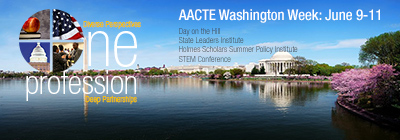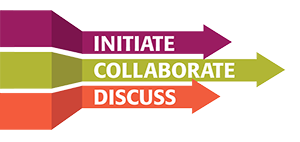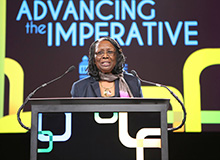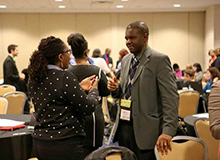14 Apr2015
By Rodrick Lucero

Join your voice with those of other educator preparation providers at AACTE’s annual Washington Week, to be held in the nation’s capital June 9-11. Under the unifying theme “Diverse Perspectives, Deep Partnerships, One Profession,” this year’s Washington Week will be held at the Washington Marriott Wardman Park Hotel. This is your chance to deliberate with colleagues on provocative issues in the profession, experience interactive sessions with national leaders, and convene with policy officials.
14 Apr2015
By Mark Ginsberg and Renée A. Middleton
AACTE has long supported the role of accreditation in the field and continues to uphold the Council for the Accreditation of Educator Preparation (CAEP) as the profession’s single accreditor. This commitment was reaffirmed by the AACTE Board of Directors at its meeting February 26, 2015. Along with offering this affirmation of support, the resolution passed by the Board also sought to open a conversation with CAEP around persistent concerns raised by the field with respect to CAEP’s standards, process, capacity, and representativeness in its governance structure.
13 Apr2015
By Kristin McCabe
Are you thinking of applying for a federal “First in the World” (FITW) grant? Learn about the program during a free webinar with the U.S. Department of Education this Wednesday, April 15, 4:00-5:00 p.m. EDT.
The FITW program is run through the Department’s Fund for the Improvement of Postsecondary Education office. Intended to spur collaborative innovation among institutions of higher education and partnering nonprofit organizations, FITW grants target improved educational outcomes, college affordability, and an evidence base of effective practices. The grants are funded at $60 million this year, including a $16 million set-aside for minority-serving institutions.
13 Apr2015
By Tracy Spesia
Editor’s Note: Tracy Spesia, a nationally trained edTPA scorer, is the recent recipient of an innovation award from the University of Saint Francis for her work on edTPA at the College of Education. According to the university, Spesia’s “creative and successful efforts with the implementation of edTPA have positioned USF as a leader in the state” and have helped enhance “the quality of USF students’ application of theory into practice during their field experiences.” In recognition of her leadership, she was appointed to the Illinois Association for Teacher Education in Private Colleges as the edTPA liaison. Spesia also serves on the executive board of the Illinois Association of Colleges for Teacher Education. Click here for information about becoming an edTPA scorer.
This year I became an official edTPA scorer, and it is one of the most rewarding professional experiences I have had since I started working in the area of teacher preparation.
10 Apr2015
By Kim Murray

Did you know that AACTE has 14 topical action groups (TAGs) established to date? TAGs are member-initiated working groups that are supported by AACTE. Anyone from a member institution can join existing TAGs, or start their own TAG, at any time.
TAGs address topics as diverse as accreditation, diverse workforce development, research in teacher preparation, and women in the deanship, among others. (For a complete list of TAGs, visit our web site).
07 Apr2015
By Deborah Koolbeck
Today, Chairman Lamar Alexander (R-TN) and Ranking Member Patty Murray (D-WA) of the Senate Committee on Health, Education, Labor, and Pensions (HELP) released a bipartisan bill on the reauthorization of the Elementary and Secondary Education Act (ESEA). A summary of the bill, dubbed the Every Child Achieves Act, can be found here. The full bill can be found here.
07 Apr2015
By Jerrica Thurman
Kick off the summer with AACTE’s signature June events: Washington Week and the Leadership Academy. Join your colleagues from around the country in Washington, DC, advocating for the profession on Capitol Hill and participating in a special conference on closing the achievement gap in science, technology, engineering, and mathematics (STEM) fields; or meet with fellow new deans and administrators in Cincinnati, Ohio, for intensive leadership development and networking. These are two popular summer conferences, so mark your calendar today!
07 Apr2015
By Etta R. Hollins

Editor’s Note: Professor Hollins inspired attendees of AACTE’s recent Annual Meeting in Atlanta during the Speaker Spotlight Session. (View a video recording of her speech here, and read another version in this Hechinger Report piece, which includes the video she played during her address.) To follow up on her presentation, we invited Hollins to explore her topic in a series of blogs for Ed Prep Matters. This is the final post in the series.
Most teachers in urban schools, as elsewhere, are dedicated professionals who put much effort into their practice and care deeply about the students they teach. Teachers understandably feel frustrated when their students fail to meet expectations for learning outcomes. How they address this frustration, however, makes all the difference for student outcomes—and it is influenced heavily by the ideology developed in their school’s professional community.
06 Apr2015
By Sharon Robinson
News Flash! The interest of students and their opportunity to learn is not better or even well served by a strategy of constant and high demand of inexperienced teachers. Retention matters, not just to teachers but, most critically, to students.
Recent studies showing that teacher effectiveness continues to develop over time reinforce this imperative to do right by our students. First, in a working paper completed last year for the National Center for Analysis of Longitudinal Data in Education Research, researchers at Duke University found that middle school teachers’ effect on student test scores as well as attendance rates improves over at least several years. A subsequent study out of Brown University found improvement in teacher effectiveness is indeed steepest in the early years in the classroom but continues for many more years, challenging the common perception that teacher quality is a fixed characteristic after just a couple of years of experience.
02 Apr2015
By Zachary VanHouten
The National Council on Teacher Quality (NCTQ) has re-engaged its data collection efforts in preparation for its 2016 Teacher Prep Review—scheduled for an October 2016 release. In an e-mail message to programs throughout the country, NCTQ has sent both an overview of the changes for the 2016 review and an itemized data request for each program, requesting that institutions notify NCTQ if they plan to comply with the request by April 20.
31 Mar2015
By Omar Davis and Whitney Watkins

AACTE Holmes Scholars connect during the Annual Meeting in Atlanta
More than 60 AACTE Holmes Scholars® participated in the Annual Meeting in Atlanta last month. The commitment of their 15 host institutions, as well as of AACTE, to building a more diverse professional community was on full display in the lively atmosphere and collegial environment at the conference, which offered a platform of reinvigoration for some and the start of an exciting journey for others. One attendee commented that she had not experienced that much energy in quite a while.
At the kick-off session February 27, AACTE’s Rodrick Lucero, vice president for member engagement and support, described the Association’s renewed commitment to the Holmes Scholars Program and emphasized its value and necessity in the field. He highlighted goals for the coming year, which touched on not only recruiting and retaining scholars in academia, but looking closely at the entire continuum of PK-24. Lucero praised the National Association of Holmes Scholars Alumni (NASHA) for its continued support in providing highly sought-after mentoring services for 1st-year and midlevel doctoral students.
31 Mar2015
By Zachary VanHouten
Attendees of the 67th AACTE Annual Meeting in Atlanta were offered an opportunity to meet with a U.S. Department of Education official to discuss the Teacher Quality Partnership (TQP) grants and how they may explore applying for them in the future.
In a concurrent session presentation, Mia Howerton of the U.S. Department of Education Office of Innovation and Improvement provided attendees with an overview of the TQP grants and what the profile of a successful grantee applicant typically looks like. With the TQP program now in its third grant cycle, Howerton reviewed the successes and challenges of the program and shared its lessons with audience members.
31 Mar2015
By Etta R. Hollins

Editor’s Note: Professor Hollins inspired attendees of AACTE’s recent Annual Meeting in Atlanta during the Speaker Spotlight Session. (View a video recording of her speech here, and read another version in this Hechinger Report piece, which includes the video she played during her address.) To follow up on her presentation, we invited Hollins to explore her topic in a series of blogs for Ed Prep Matters. This is the second post in the series.
Teaching is an interpretive practice that requires knowledge of the community where students grow and develop, and where they are socialized. Students’ initial and ongoing learning happens within a particular community; is framed by the ideologies and practices of the community; is influenced by the experiences, interests, and values shared among members of the community; and is appropriated through the learner’s perception, which is developed within the particular community. The initial learning that happens within a community constitutes the intellectual, psychological, social, and emotional development of the individual person.
27 Mar2015
By Deborah Koolbeck
TIME SENSITIVE: Responses due April 24, 2015
The U.S. Senate Committee on Health, Education, Labor, and Pensions (HELP) seeks input from the higher education community for its work on the reauthorization of the Higher Education Act (HEA). Your feedback is requested by April 24 in these areas:
- Accreditation in higher education
- Risk sharing in student borrowing
- Data transparency and consumer information
26 Mar2015
By Deborah Koolbeck
Note: AACTE offered a free webinar to members March 25 and 26 about the next steps on the proposed regulations for teacher preparation programs. A recording of the webinar is available here.
Two new bills introduced in Congress seek to impede the U.S. Department of Education’s attempt to regulate teacher preparation programs. The Supporting Academic Freedom through Regulatory Relief Act (H.R. 970), introduced in the U.S. House of Representatives by Representative Virginia Foxx (R-NC), and its companion bill in the U.S. Senate, S. 559, introduced by Senator Richard Burr (R-NC), seek to achieve the following objectives:






